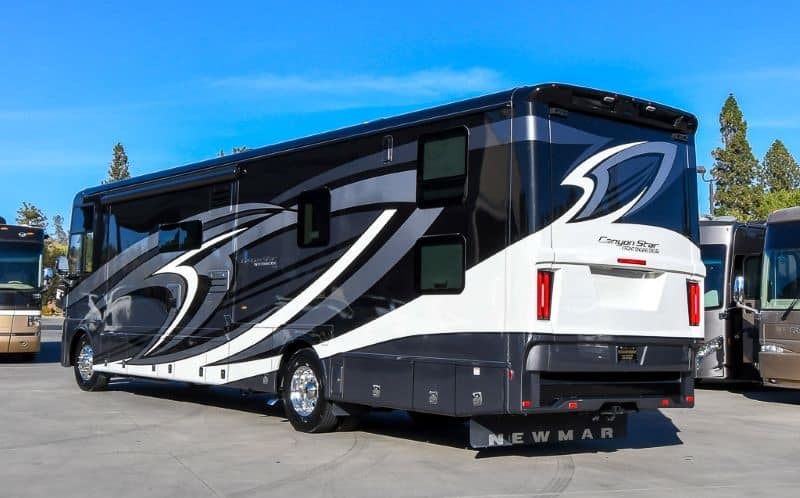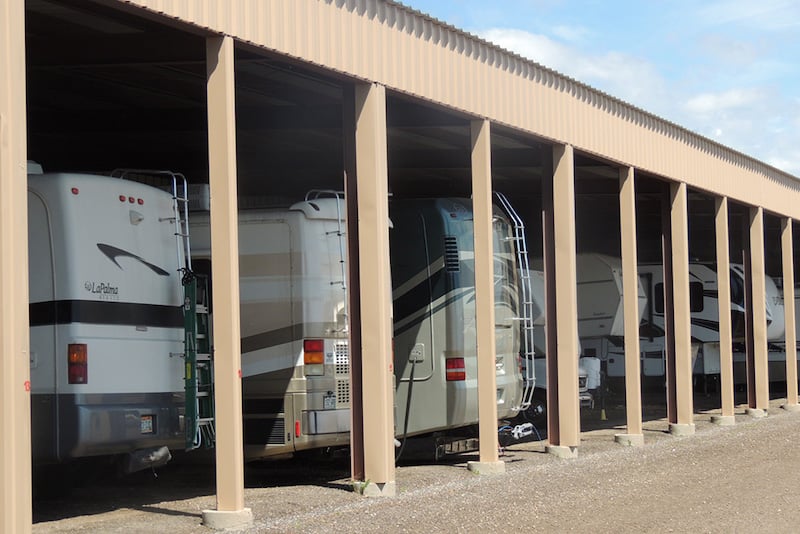Electric vehicles have become increasingly popular over the past decade. At this point, many if not most major car companies have an electric vehicle. Plenty more EV-exclusive companies, like Tesla, have also entered the market. But what about electric motorhomes?
The idea of an electric motorhome is certainly an attractive one. You’ve likely wondered if there are any on the market. Today, we’re going to take a closer look at electric motorhomes and what the outlook is for the potential electric motorhome market.
Are There Any Electric Motorhomes?
With electric vehicles becoming more and more common, you’ve likely asked yourself if there are any electric motorhomes currently on the market. Well, there’s good news and bad news.
Good news first: there are a few fully electric motorhomes on the market that you can buy right now. Many of them are based on an electric cargo van platform. The most popular is the Ford E-Transit van, which was first released for the 2022 model year.
Now the bad news: electric motorhomes are few and far between. Currently, no major RV manufacturer has one in production. But, some more good news: this is likely to change in the near future.
Many major motorhome companies are in fact working on electric motorhome prototypes. For some, production could begin as soon as next year! However, the majority of electric motorhomes likely won’t hit the market for a few more years.
As demand grows, though, we’ll likely see more and more companies releasing electric motorhomes.
Who Makes Electric Motorhomes?
Right now, there are two major motorhome companies that are set to make and release electric motorhomes: Winnebago and Thor Motorcoach. Both options will be Class B+ motorhomes, and we may see other classes in the future.
In addition to these big names, a few smaller companies already make and sell fully electric motorhomes. These are all Class B RVs, which are made either by building on an already electric platform (such as the Ford E-Transist) or by converting a gas or diesel-powered van to electric.
These options can be a bit pricey and may require a fair wait time for delivery. However, if you want an electric campervan now, this is currently your best option.
There are also a few electric travel trailers on the market at present, such as the Bowlus Volterra or Lightship RV. These don’t have motors of course, but they use electricity to power everything else in the trailer.
By towing with an electric vehicle you have another option for a fully electric RV experience.
Grounded G1 Campervan
The Grounded G1 Campervan is based on the Ford E-Transit platform. Based on our research, it appears to be the first fully electric motorhome on the market that’s based on an electric vehicle platform, rather than being converted to electric.
The G1 offers 108 miles of range, plus 640 watts of solar and a house battery module (multiple sizes available) for charging. Customers can customize the build when ordering, and the G1’s modular interior means the layout is highly customizable.
Other great features in the G1 include a full kitchen with a fridge/freezer and induction stove, a dry-flush toilet, and an outdoor shower.
Orders are currently open for delivery this year, and the G1 starts at $125,000.
Maxwell Vehicles Vanacea
The Maxwell Vehicles Vanacea is your other main option for an electric motorhome that’s currently on the market. Instead of using an already electric van, Maxwell instead converts a Ram Promaster from gas to electric.
In fact, in addition to building ready-to-go electric campervans and selling converted chassis to convert, Maxwell can also convert your existing Promaster campervan to electric.
The Vanacea boasts up to 250 miles of range with a 30-minute charge time. It also boasts a truly impressive 1500 watts of solar for additional charging. Maxwell has partnered with conversion company Rossmonster for the interiors of their vans. This ensures your van’s interior is just as high quality as what’s under the hood.
The cost of the Vanacea depends on your build, and Maxwell doesn’t publish prices on their site. However, according to some sources online, we can estimate that one of these electric motorhomes will run you somewhere between $150,000 to $200,000.
Winnebago eRV2 All-Electric Motorhome
The first major RV maker who has an electric motorhome on the horizon is unsurprisingly from Winnebago. The Winnebago eRV2 will be a fully electric, zero-emission Class B+ motorhome. It will have 125 miles of range and enough power for 7 full days of boondocking.
This is achieved with Winnebago’s proprietary IonBlade lithium house battery and backed up by versatile 3-in-1 charging (home, campground, or dedicated charging station) and a whopping 900 watts of solar.
The interior of the motorhome will feature a clean, eco-friendly interior that combines Japanese and Scandinavian design principles. A unique 5-in-q lounge will provide sleeping space, plus dual workstations and a SmartSpace bath.
These great features will be rounded out by sustainable practices throughout (such as recycled materials), plus next-level connectivity with Winnebago’s proprietary Connect system. This system is already featured in existing Winnebago motorhomes. It allows you to monitor and control your RV systems from your phone.
At present, Winnebago is actively testing its eRV2 prototype. So far, 41 testers have driven nearly 26,000 miles in order to help Winnebago perfect this impressive electric motorhome.
There’s no word on when the exact release date will be, or how much the eRV2 will cost.
Thor Vision Vehicle Motorhome
The other potentially incoming electric motorhome from a major manufacturer is the Thor Vision Vehicle.
The motorhome will be built on Thor’s exclusive motorized platform. It will be powered by a combination of a high-voltage battery pack and an integrated fuel cell. Thanks to the addition of fuel cell technology, the Thor Vision Vehicle will have an impressive 300 miles of range on a charge.
Its innovative power system and enhanced solar capabilities also mean it will be ideal for long-term off-grid camping. However, so far, Thor hasn’t given any exact details on how long exactly the vehicle will be able to stay off-grid.
A “digital cockpit” experience will provide several infotainment screens, as well as digital side and rearview mirrors. The interior of the motorhome will provide a “digital house” experience with intelligent voice features, advanced monitoring, and switchable frosted windows.
These great features will be rounded out by high-quality power management and charging systems. At present, the Thor Vision Vehicle is only a concept vehicle. It remains to be seen if or when this electric motorhome (or a similar one) will hit the market and how much it will cost.
How Much Are Electric Motorhomes?

There are very few electric motorhomes on the market right now, so it’s hard to make sweeping generalizations about how much they will cost.
As far as we can find, there are two electric motorhomes currently on the market right now: the Grounded G1 and the Maxwell Vehicles Vanacea. Only one of these, the Grounded G1, publishes its price on its site, which starts at $125,000.
Maxwell doesn’t publish the exact price of the Vanacea, and the final price depends on the build, but based on some sources online, it looks like it falls somewhere between $150,000 to $200,000.
We can make some guesses about the potential price of the Winnebago eRV2 and the Thor Vision Vehicle as well, based on the prices of their existing RVs.
For the eRV2, assuming it will be in a similar price range as their other luxury Class Bs, we expect it will be somewhere around $200,00. The Thor Vision Vehicle is a bit more of a toss-up due to it being a concept vehicle using unique fuel cell technology, but based on their existing Class Bs, the price will likely be somewhere in the $175,000 to $200,000 range.
So, currently, the price of an electric motorhome seems to fall somewhere between $100,000 and $200,000. As the market grows and more electric motorhomes become available, we’ll be able to get a better sense of just how much they’ll cost.
How Far Can Electric Motorhomes Drive On A Charge?
The exact range of different electric motorhomes varies quite a bit, based on several different factors. On top of this, with so few electric motorhomes on the market, it’s hard to make any solid statements about range. That said, we can get some ideas by looking at existing and upcoming options.
The Grounded G1 has a stated range of just over 108 miles. This is the same as Ford’s stated max range for the high-roof version of the E-Transit van that Grounded uses.
We can assume that any electric motorhome using this platform will have the same limit. It is worth noting that Ford is planning to release an E-Transit with an upgraded 236-mile range.
The Maxwell Vehicles Vanacea, meanwhile, offers two different range options: 150 miles and 250 miles. Because they provide a custom electric drivetrain, though, it’s hard to say how well this applies to other electric vehicles.
Winnebago, meanwhile, says the eRV2 will have about 125 miles of range when it releases. But they also say they are actively researching ways to extend this range. So we’ll hopefully see a longer range in the production version.
The Thor Vision Vehicle is a bit more promising thanks to its use of fuel cell technology. Thor claims an impressive 300-mile range for their electric motorhome. However, it is worth noting that the Vision Vehicle is still only a concept vehicle.
So, as we can see, there’s quite a bit of variance in EV and electric motorhome ranges. Right now, ranges seem to fall between 100 miles and 300 miles. As this technology matures, we’ll hopefully see longer-range electric motorhomes that are more suited to long road trips.
Can They Make Class A Electric Motorhomes?
Right now, every current or potential electric motorhome is a Class B or Class B+ RV. This makes sense, given they’re smaller and lighter and thus can go further on a charge. Plus, electric cargo vans have existed for a few years now.
Larger classes of electric motorhomes, like Class As, may eventually hit the market as well, although at this point, it’s all speculation. As far as we’re aware, no RV manufacturer is currently developing an electric Class A motorhome.
That said, well-known EV maker Tesla does have an electric semi-truck platform in the works, which would be a promising candidate for a great Class A.
As electric vehicles and electric motorhomes become increasingly popular, we’ll likely see larger electric motorhomes hitting the market eventually. But for now, you’ll just have to keep an eye out for any new developments.
Do Campgrounds Have EV Charging Stations?
While electric vehicles have become increasingly popular, the charging infrastructure to support them is still fairly lacking. This is true not just on the highway, but also at RV campgrounds.
A few campgrounds (including many KOAs) as well as several state parks and national parks do feature EV charging stations on their grounds. But, because there are currently few electric motorhomes on the market, and full electric vehicles are rarely used as tow vehicles, campgrounds don’t have much incentive to install them.
That said, as the EV (and electric motorhome) market grows, we’ll likely see this begin to change, and more and more campgrounds will begin installing charging stations.
Final Thoughts About Electric Motorhomes
Right now, electric motorhomes are in the earliest days of their infancy. There are very few options available to buy right now, such as the Grounded G1 and Maxwell Vehicles Vanacea, and only a few more on the horizon from companies like Winnebago and Thor.
But, this is likely to change rapidly over the coming years. Demand for electric vehicles continues to grow, and car companies continue to develop their electric vehicle platforms to have longer and longer ranges.
With several potential electric motorhome platforms on the market, there’s plenty of potential for more electric motorhomes.
So, if you’re dreaming of having an electric motorhome, there are a few options for you. But, if you don’t mind a bit of waiting, the next few years are extremely promising for the electric vehicle market.
Who knows, before long, electric motorhomes might even become just as common as gas-powered ones!
Related Reading:
– How Do You Charge An Ebike While Camping?
– Does An RV Fridge Work Better On Gas Or Electric?
– How To Easily Find RV-Friendly Gas Stations
– How Often Do Motorhomes Break Down?
About the Author:
Ryan Milejczak (mill-LAY-check) is a full-time freelancer writer and Florida native with a passion for RVs.
Currently, he’s saving up to do his own camper van conversion, which he plans to take across the US and Mexico.
When he’s not writing, Ryan loves cooking, hiking, practicing his Spanish, and taking care of his plants (currently at 23 plants and counting!)




